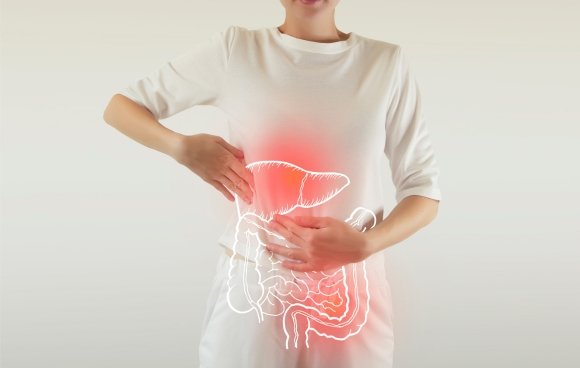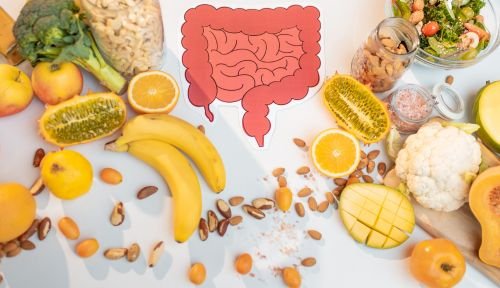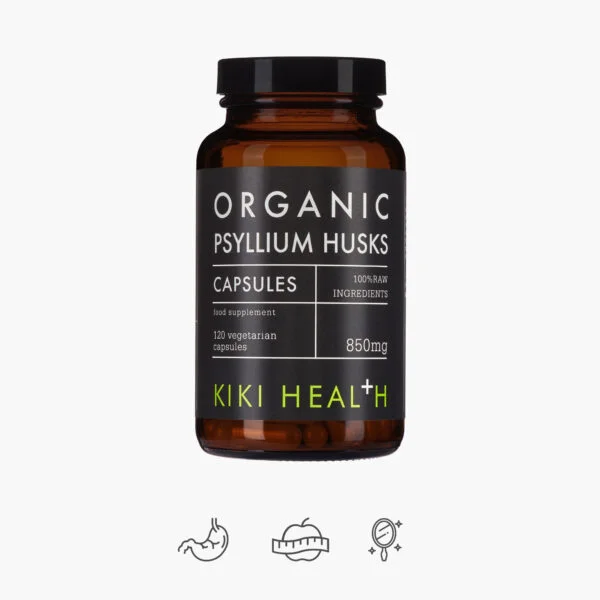We will take an in-depth look at how the digestive system works and provide practical advice on how to maintain or improve digestive health.
We will learn about the importance of a healthy digestive system to overall health, discuss the main digestive problems and their symptoms, and suggest ways to address these problems through diet, lifestyle changes and supplements such as probiotics.
We will provide advice on wholesome food consumption, adequate fiber and healthy fat intake, and other useful and important aspects…..
The gut and why it's so important
The gut or digestive system consists of the gastrointestinal tract (GI). Ideally, parts of our body such as the esophagus, stomach, small and large intestines are functioning properly so that we can eat and digest food without discomfort.1
The intestine absorbs nutrients from the food we eat and removes waste. It also has many other important functions such as removing harmful substances from our body and balance of beneficial bacteria support
You have a healthy digestive system if the entire digestive tract is working well. However, if the intestines do not function well, diseases such as:
- Type 2 diabetes
- inflammatory bowel disease (IBD)
- colon cancer
Gut health plays an important role in the health of our whole body even the mood.

How do I know if my digestive system is working well or not?
A healthy gut contains different types of good bacteria that help digest nutrients, support a healthy immune system, and even help for proper nervous system function.
A healthy gut also communicates with brain via nerves and hormones, which helps maintain overall health and well-being.
When the digestive system is disturbed, nutrients are not absorbed or are poorly absorbed. Therefore, the body gradually weakens and symptoms begin to appear. In order to feel good, it is important to ensure efficient absorption of vitamins and minerals.
Symptoms that may indicate problems with the digestive system include:
- stomach pain
- flatulence
- diarrhea
- constipation
- heartburn
- nausea
- vomiting
What to do for healthy digestion?
Diet and lifestyle changes, such as eating whole foods and avoiding late-night meals, can have a positive impact on your gut health.
Everyone experiences digestive symptoms from time to time, such as upset stomach, gas, heartburn, nausea, constipation, or diarrhea.
If the symptoms persist for a long time, even though you have tried the recommended by specialists probiotics, fibers or enzymes, may require more medical attention.
However, when these symptoms occur very often, they disrupt the rhythm of life and well-being.

Complete food for improving digestion
"Real and whole" foods are minimally processed, rich in nutrients, and provide multiple health benefits.
On the other hand, the highly processed foods found in the typical Western diet are often high in refined carbohydrates, saturated fat, and food additives. Consuming processed foods is very often associated with an increased risk of digestive disorders.
Food additives, including glucose, salt and other chemicals, are thought to increase intestinal inflammation.
Inflammation can impair intestinal barrier function, leading to increased intestinal permeability. In turn, increased intestinal permeability can contribute to a variety of health conditions.
Some processed foods may contain harmful trans fats. In the past, most trans fats in processed foods were partially hydrogenated oils.
Therefore, for optimal digestion, it is best to eat REAL food and limit processed foods.

Why good fiber is valuable for digestion
It is common knowledge that fibers are useful for good digestion.
Soluble fiber absorbs water and helps bulk up the stool. Insoluble fiber acts like a giant toothbrush to help your digestive tract keep everything in place.
Soluble fiber is found in oats, barley, and legumes, while whole grains, nuts, and seeds are good sources of insoluble fiber. Fruits and vegetables can contain both soluble and insoluble fiber, so eating a variety of these foods will ensure you get plenty of each type.
The daily reference intake (RDI) for fiber is 25 grams for women aged 19 to 50 years. For men ages 19 to 50, the OSS for fiber is 38 grams. However, most people consume only half of the recommended daily allowance.
A high-fiber diet has been associated with a reduced risk of digestive disorders, including constipation, inflammatory bowel disease, and colorectal voiding.
-
Sale Product on saleKIKI Health Organic PSYLLIUM HUSKS - Natural Fiber for the gut, 120 capsules
39,90 €Original price was: 39,90 €.27,90 €Current price is: 27,90 €.Rated 5.00 out of 5 based on 5 customer ratings
What healthy fats and digestion have to do with it
Eating enough fat may be necessary for good digestion. Fats help you feel full after a meal and are needed for the proper absorption of certain nutrients such as vitamins A, D, E, and K.
Some studies show that omega-3 fatty acids may reduce the risk of inflammatory bowel diseases such as ulcerative colitis, although more research is needed.
Foods rich in beneficial omega-3 fatty acids include flaxseeds, chia seeds, nuts (especially walnuts), as well as fatty fish such as salmon, tuna, mackerel and sardines.

Why drinking fluids is important for digestion
Low fluid intake is a common cause of constipation.
Your total fluid intake comes from plain water, other drinks, and the food you eat. Experts recommend drinking it every day optimal amount of water, to make sure you're getting the fluids you need without the added sugar and calories.
You may need more water than usual if you're in a warm climate, you're exercising hard, and you're feeling sick.
In addition to water, you can also supplement your fluid intake with herbal teas and other caffeine-free beverages, such as seltzer water.
Another way to meet your fluid intake needs is to include fruits and vegetables that are high in water, such as cucumbers, bell peppers, broccoli, strawberries, apples, and oranges.
Stress affects digestion
Stress may adversely affect your digestive system.
Stress hormones directly affect your digestion. When your body is in fight-or-flight mode, it thinks you don't have time to rest and spend digesting it. During periods of stress, blood and energy are diverted from your digestive system.
Also, your gut and brain are closely linked – what affects your brain can affect digestion as well.
Therefore, using stress management techniques such as deep diaphragmatic breathing, meditation or yoga can improve not only your mindset but also your digestion.

What is the difference between food allergy and food intolerance?
The main difference between a food allergy and a food intolerance is that a food intolerance can cause a lot of discomfort, while a food allergy can be life-threatening.
A food allergy occurs when your immune system overreacts to a food protein that other people would consider harmless. As a result, the body produces an antibody called immunoglobulin E (IgE), which can cause a variety of symptoms (severe or mild).
Food allergy symptoms range from mild (such as hives) to severe (anaphylactic shock) and can lead to death.
Most food-related symptoms occur within 2 hours of eating. They often start within minutes. In some very rare cases, the reaction may start after 4 to 6 hours or even later.
Food intolerance occurs when the body cannot properly digest the food it eats or when certain foods can irritate the digestive system. Lactose intolerance is an example of a food intolerance.
What can harm the digestive system?
There is no doubt that many aspects of modern life can harm our gut health, including:
- daily stress
- lack of sleep
- consumption of processed foods
- diseases
- antibiotic use
An imbalance in the gut microflora, also known as dysbiosis, can increase the likelihood of problems such as irritable bowel syndrome (IBS), diabetes, obesity, heart disease and central nervous system disorders.

How do probiotics help the digestive system?
Probiotics contains "good bacteria" similar to those found in your gut and in fermented foods such as yogurt. They contain Lactobacillus or Bifidobacterium bacteria. However, not all fermented foods contain probiotics.
Kimchi (a Korean fermented cabbage dish) and kombucha (fermented tea) also contain good bacteria, but their potential probiotic benefits have not been well studied.
-
Sale Product on saleKIKI Health BODY BIOTICS Probiotics - good bacteria with live prebiotics, 60 vegcapsules
49,90 €Original price was: 49,90 €.32,40 €Current price is: 32,40 €.Rated 5.00 out of 5 based on 1 customer rating
Many people experience frequent stomach pain, bloating, constipation and diarrhea, all of which are present JS symptoms. Probiotics can provide relief.
For probiotics to be effective, it is recommended to choose those that contain prebiotics. This is very important because prebiotics are food for good bacteria. Which is needed to restore the balance of good bacteria in our gut.
According to a review published in the journal Nutrients, participants who took high-quality probiotics for 8 weeks experienced less stomach pain and improved quality of life.

What is important to know when choosing probiotic supplements?
Choose probiotics with bacterial cultures, such as: Bacillus Subtilis, Bacillus Licheniformis, Lactobacillus Acidophilus, Lactobacillus Casei, Lactobacillus Plantarum, Lactobacillus Rhamnosus, Lactococcus Lactis, Bifidobacterium Bifidum.
Check the label for recommended storage guidelines. For example, some must be refrigerated while others can be stored at room temperature.
Are probiotics safe for children?
Research shows that probiotics are safe and may be helpful in preventing upper respiratory infections and diarrhea.
Two probiotic families, which in 2017 In the study, there were Lactobacillus rhamnosus GG (LGG) and S. boulardii. LGG reduced the risk of antibiotic-associated diarrhea by 13 percent. The S. boulardii strain reduced C. difficile-related diarrhea by 12 percent.
Should probiotics be avoided?
Probiotics are "good" bacteria that help support the digestive system and strengthen the immune system. You can take them as a dietary supplement or get them from food sources like yogurt. But should you? They may be helpful in some cases, but we still need more research to tell if and when they are safe and effective in older adults.
Microbes in the lower intestinal tract help us digest food, fight harmful bacteria, and regulate the immune system. However, sometimes a microbial imbalance occurs, leading to diarrhea and other health problems.
When the gut is out of balance due to unhealthy levels of certain bacteria, probiotics can help restore balance. They have been shown to secrete protective substances that can activate the immune system and prevent pathogens from taking hold and causing serious illness. However, we are still learning to understand how probiotics can promote health.
Probiotics are safe for most people. But check with your doctor first if you have health problems. Anyone with a serious medical condition should be closely monitored by a healthcare professional.
The most frequently asked questions are about digestion
What are the main stages of digestion?
the process of digestion involves chewing, acid digestion in the stomach, breakdown of food in the intestine with the help of enzymes, and finally absorption of nutrients.
How can digestion be improved?
Digestion can be improved by eating regularly, avoiding too much food at one time, including fiber-rich foods in the diet, and drinking enough water.
What problems can occur with digestion?
Common digestive problems include constipation, diarrhea, heartburn, bloating, and a syndrome called irritable bowel syndrome (IBS).
When should you see a doctor for digestive problems?
If digestive problems are persistent, severe, or accompanied by worrisome symptoms such as blood in the stool or unexplained weight loss, a doctor should be consulted.
It's important
It is important to remember that everyone's health is individual and there is no one-size-fits-all recipe!
So, if you want to know if your body needs probiotics the most right now, health professionals recommend the Test "Your Day".
*In time, pay attention to the signals sent by your well-being;
*Replenish the body with natural minerals, vitamins and nutrients necessary for health.
*Enjoy energy and good mood every day!













